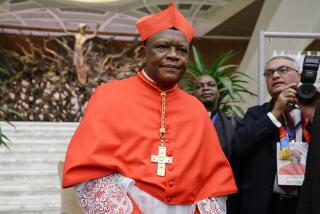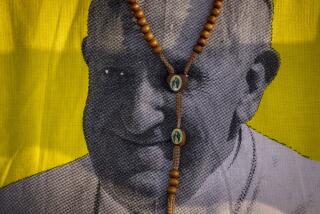Matters of Life or Death Are Also Questions of Ethics and Morals : Comatose patients: Catholic bishops come out in favor of continued artificial feeding of people regarded to be permanently unconscious.
- Share via
WASHINGTON — The nation’s Roman Catholic bishops, addressing a moral issue that has caused division in their ranks, have called for “a presumption” in favor of artificial feeding for people regarded to be permanently unconscious.
Thursday, the National Conference of Catholic Bishops released a statement that opposes the increasingly widespread practice of removing feeding tubes from comatose patients.
The 35-page statement, prepared by the bishops’ Committee for Pro-life Activities, also runs up against the opinions of individual Catholic bishops who have already given their blessing to the practice.
“We are gravely concerned about current attitudes and policy trends in our society that would too easily dismiss patients without apparent mental faculties as non-persons or as undeserving of human care and concern,” the statement says.
While calling the statement “our first word, not our last word” on the subject, the bishops added: “Decisions about these patients should be guided by a presumption in favor of medically assisted nutrition and hydration.”
At issue are people in what doctors call a “persistent vegetative state” and the feeding tubes that keep them alive. In different places, bishops and theologians have come down on different sides of the issue.
In Florida, Maryland, New Jersey and Pennsylvania, state organizations of Catholic bishops have argued that comatose patients, as a general rule, should receive the medical care.
Yet in Missouri and Texas, the bishops’ organizations have issued statements that place emphasis on the morality of withdrawing artificial nutrition in certain cases. The Catholic Archdiocese of Minneapolis has echoed this view.
Ethicists familiar with the debate say the new statement, issued by the bishops’ national organization, comes down on the side of bishops who have taken a dim view of withdrawing food and fluids.
The Rev. Kevin O’Rourke, an ethicist who has advised the Missouri bishops on the question, expressed disappointment with the position.
“It’s inadequate,” said O’Rourke, who directs the Center for Health Care Ethics at St. Louis University Medical Center. “In a certain sense, it’s a document behind the times.”
O’Rourke said the statement fails to make a convincing case that living in a persistent vegetative state “is a positive human good” and that the provision of artificial sustenance is thus a moral obligation.
“The bishops could say it’s a positive human good until 1999, but people still won’t believe it,” he said. “People just don’t look upon PVS as a positive good.”
Yet the statement drew praise from William E. May, a moral theologian at the John Paul II Institute for Studies on Marriage and Family here. He said the document affirms the thinking of those who look upon tube-feeding as “an ordinary means” of care due all patients.
May and other theologians have opposed the removal of artificial nutrition except in certain cases, such as when death is imminent and the patient can no longer digest food and fluids.
The bishops’ statement voices concern that many people have come to regard the removal of life support as “appropriate or automatically indicated for the entire class of PVS patients simply because of a judgment that they are beyond the reach of medical treatment that would restore consciousness.”
Asked if he believed the statement would settle the differences among Catholic bishops and theologians, May said. “I sort of doubt that. The discussion will continue.”
The statement was drafted by a panel headed by Bishop James McHugh of Camden, N.J., and adopted by the bishops’ pro-life committee, which speaks for the U.S. Catholic hierarchy on issues such as abortion and medical ethics.
More to Read
Sign up for Essential California
The most important California stories and recommendations in your inbox every morning.
You may occasionally receive promotional content from the Los Angeles Times.













